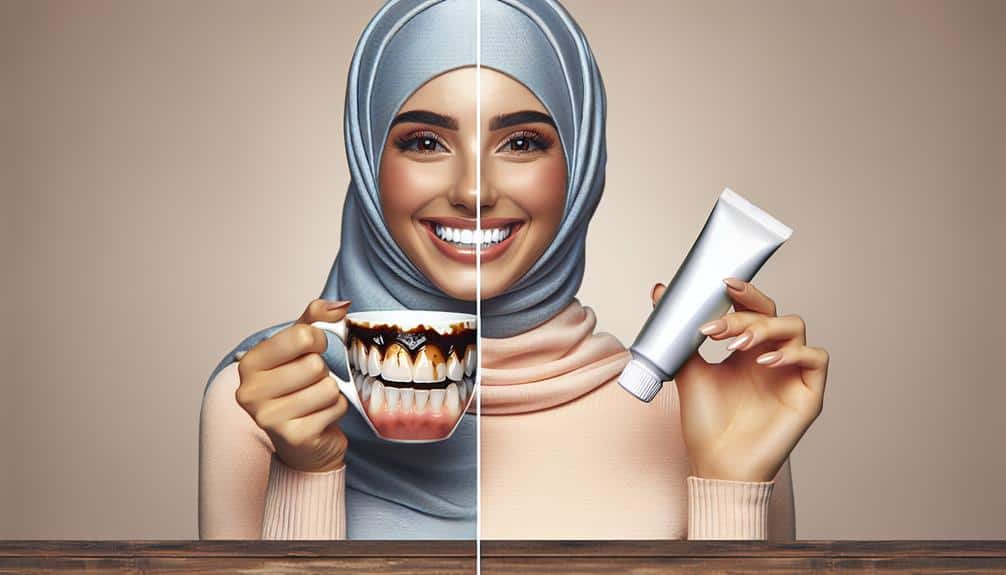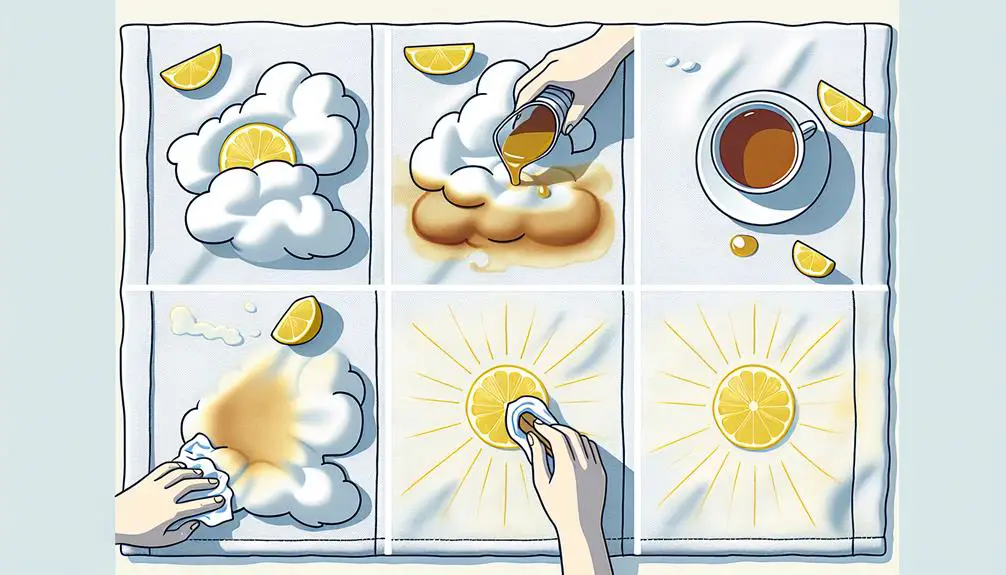To remove tea stains from your teeth effectively, try proven techniques. Tannins and pigments in tea can penetrate enamel, causing discoloration. Regular rinsing with water after tea can help. Home remedies like baking soda paste or oil pulling may whiten teeth. Professional dental treatments such as bleaching or laser whitening are options for stubborn stains. Prevent staining by brushing and flossing daily, limiting staining foods, and promoting saliva production. Natural methods like oil pulling and baking soda can enhance whitening. Implement these tips to achieve a brighter smile.
Key Points
- Rinse mouth with water after consuming tea to reduce tannin exposure and staining.
- Use baking soda paste to scrub away tea stains with its natural whitening properties.
- Consider professional dental treatments like bleaching or laser whitening for stubborn stains.
- Practice oil pulling with coconut or sesame oil to remove toxins and bacteria causing stains.
- Maintain good oral hygiene, limit staining foods, and promote saliva production to prevent tea stains.
Understanding Tea Stain Discoloration
Tea stain discoloration is a common dental issue caused by the tannins in tea penetrating the enamel of your teeth. The pigments from tea can bind to the enamel, leading to stains that are challenging to remove. To effectively address tea stains, understanding the causes and prevention methods is essential.
Tea stains can be stubborn to remove due to their ability to seep into the microscopic pits and cracks in the enamel. Regular consumption of tea without proper oral hygiene can exacerbate this issue. Prevention is key in managing tea stains on your teeth. Rinsing your mouth with water after drinking tea can help reduce the exposure of your teeth to tannins. Additionally, maintaining a good oral hygiene routine, including regular brushing and flossing, can aid in preventing tea stains from setting in.
Effective Home Remedies for Whitening
Consider incorporating baking soda into your dental care routine as an effective home remedy for whitening teeth stained by tea. Baking soda, also known as sodium bicarbonate, has natural whitening properties that can help remove surface stains caused by tea consumption. Here are three home remedies you can try to brighten your smile:
- Baking Soda Techniques: Create a paste by mixing baking soda with water and apply it to your teeth using a toothbrush. Gently brush for about two minutes before rinsing thoroughly. This method can help scrub away stains and brighten your teeth over time.
- Lemon Juice: Lemon juice is known for its bleaching properties. However, be cautious as its acidic nature can erode tooth enamel. Mix a small amount of lemon juice with water and use it to rinse your mouth after brushing. Limit the frequency of use to prevent damage to your teeth.
- Oil Pulling: Swishing oil, such as coconut or sesame oil, in your mouth for about 15-20 minutes can help remove toxins and bacteria. Some claim it may also help whiten teeth, although more research is needed to confirm its effectiveness.
Professional Dental Treatments for Stains
To effectively address stubborn dental stains caused by various factors, professional dental treatments offer advanced solutions for whitening teeth and restoring a brighter smile. Dental bleaching is a common procedure where a bleaching agent is applied to the teeth to lighten their color. This process can be done in-office by a dentist or at home under the dentist's supervision. It's effective in treating stains caused by tea, coffee, tobacco, and other sources.
Another professional dental treatment for stubborn stains is laser whitening. Laser whitening involves the use of a specialized light to activate a whitening agent applied to the teeth. The light enhances the bleaching process, resulting in faster and more effective stain removal. This method is often preferred for its quick results and minimal sensitivity compared to traditional bleaching techniques.
Seeking advice from a dental professional is essential to determine the most suitable treatment option based on the severity and cause of the stains. Dental bleaching and laser whitening are advanced techniques that can provide noticeable improvements in the whiteness of your teeth, helping you achieve a brighter and more confident smile.
Prevention Tips to Avoid Staining
To maintain a bright smile and prevent staining on your teeth, adopting good oral hygiene practices is essential. Consistent care can help keep your teeth looking their best. Here are three preventive habits and dietary changes to incorporate into your routine:
- Regular Brushing and Flossing: Brush your teeth at least twice a day and floss daily to remove plaque and prevent staining from developing. This simple routine can go a long way in maintaining a bright smile.
- Limit Staining Foods and Drinks: Cut back on tea, coffee, red wine, and dark-colored sodas that can stain your teeth. If you do consume these beverages, rinse your mouth with water afterward to help reduce the staining effect.
- Eat Teeth-Friendly Foods: Incorporate crunchy fruits and vegetables like apples, carrots, and celery into your diet. These foods can help naturally clean your teeth and prevent staining by promoting saliva production, which helps wash away food particles and bacteria.
Natural Ways to Brighten Your Smile
Brighten your smile naturally with effective home remedies and practices that can help enhance the whiteness of your teeth. Two popular methods to contemplate are oil pulling and using baking soda.
Oil pulling, an ancient Ayurvedic technique, involves swishing a tablespoon of oil (such as coconut or sesame oil) around in your mouth for about 15-20 minutes. This process is believed to remove bacteria and toxins that can lead to teeth staining, promoting overall oral health and potentially whitening your teeth.
Baking soda, known for its mild abrasive properties, can help scrub away surface stains on teeth. You can create a paste by mixing baking soda with a small amount of water and brushing your teeth gently with it. However, it's important not to use baking soda too frequently as it can wear down your tooth enamel over time.
These natural methods can complement your regular oral hygiene routine and may contribute to a brighter, whiter smile when used appropriately.
Frequently Asked Questions
Can Tea Stain Discoloration Be Reversed Completely With These Techniques?
Yes, tea stain discoloration can be reversed completely with effective tea stain removal techniques. Dental treatments, including professional whitening and cosmetic dentistry, can help restore the natural whiteness of your teeth, providing a lasting solution to discoloration.
Are There Any Specific Types of Tea That Are More Likely to Cause Stains Than Others?
Certain tea varieties, like black tea, are more likely to cause staining due to their high tannin content. Considering teeth whitening, effectiveness may vary based on the severity of stains. Regular dental check-ups can help manage tea-related discoloration.
How Often Should I Repeat These Home Remedies for Whitening to See Results?
To see noticeable results, repeat home remedies for whitening consistently. Applying them too frequently may harm your enamel, so aim for every other day. Long-term effects include brighter teeth and improved oral health.
Are There Any Specific Foods or Drinks I Should Avoid to Prevent Further Staining?
To prevent further staining from tea or other beverages, avoid foods that are highly pigmented like berries, curry, and tomato sauce. Best practices include rinsing your mouth after consuming stain-causing foods and drinks to maintain a brighter smile.
Can Natural Ways to Brighten Your Smile Be Harmful to Enamel in the Long Run?
While natural remedies like baking soda can brighten your smile, using them excessively can harm enamel in the long run. Protect enamel by limiting their use and considering professional teeth whitening techniques for a safer approach.



